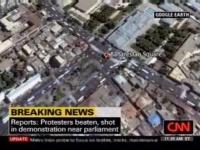BROOKE GLADSTONE: This is On the Media. I'm Brooke Gladstone.
BOB GARFIELD: And, I'm Bob Garfield. On Wednesday in Iran, a group of protestors descended upon Baharestan Square near the Parliament building in Central Tehran. That’s about all we know, for sure. We have shreds of information, mostly unvetted, like this disturbing phone call from an unnamed woman to CNN.
WOMAN: [DISTRESSEDLY] This was exactly a massacre. You should stop this. You should stop this. You should help the people of Iran who demand freedom.
MALE CORRESPONDENT: Um – uh -
WOMAN: You should help us!
BOB GARFIELD: The New York Times wrote that it was, quote, “difficult to ascertain exactly what happened” on Wednesday. We depend for news on Iran lately on cries of distress like this, accounts and images produced by Iranians inside Iran, because most reporters have been forced to leave. Others, like Newsweek’s Maziar Bahari, have been arrested. Reporter Jason Rezaian was covering the elections and protests for the news site TehranBureau.com, right up until he left Sunday night. He wasn't forced. He decided to leave. He’s now in Dubai. He says he used to hear people refer to Iran as a fascistic state but never thought that was true.
JASON REZAIAN: But the last two or three days that I was in the country, it definitely had that feel to it, I mean, you know, armed police on every single corner, people not being allowed to congregate, brutal crackdowns, beatings the likes of which I didn't think were possible. On top of that, people that were being beaten, rather than being treated by doctors, nurses or allowed to go away in ambulances, were being hauled off as prisoners.
BOB GARFIELD: There are two narratives on this story, one that’s reaching the outside world as it pieces together the story of a crackdown on free speech, free assembly, and then there’s the story that Iranians are getting from their state media.
JASON REZAIAN: It, it boggles the mind. As I was leaving the country, I was watching the state TV in the airport and they were showing one of the Basij militiamen who, you know, we've been hearing so much about the last week or so, being beaten by protestors. And, you know, the – the commentator was saying, you know, you see these protestors, these are terrorists, they're beating the defenders of our state, when the opposite is the reality of the situation. They just happened to catch some people taking out their frustrations [LAUGHS] on one of these guys. And, and the response from the people who were watching was curious. I mean, they were smiling.
BOB GARFIELD: Foreign reporters were essentially held under house arrest. That is, they were not permitted to leave their quarters to report what was going on in the street. Can you tell me what form that took? I mean, were there armed thugs outside of hotel rooms? How did they enforce this crackdown?
JASON REZAIAN: I can't speak to that too much because I'm an Iranian citizen, as well, as being an American citizen. You know, I was living in my own apartment there, and I can tell you that nobody was standing at my door telling me I couldn't go out of the house. But when I did leave the house, I'd get calls - you know, you should go back home – from unnamed officials.
BOB GARFIELD: I want you to clarify that for me. You leave the house, your phone rings and someone’s telling you to go back home. You were clearly being shadowed.
JASON REZAIAN: Yeah. When you think about it, there’s very few foreign news representatives allowed in the country, in the first place. It’s not that hard to keep tabs on us. And now, you know, we're hearing a lot of stories coming out of Iran that people are worried to speak on the telephone, worried that their emails are being monitored. That might be the case. I can't see how they would be monitoring everybody. But when it comes to foreign media, I think it would be very easy to monitor our comings and goings without too much extra effort.
BOB GARFIELD: Foreign reporters were asked to leave the country. Their visas expired and the regime said, okay, time to go. You have dual citizenship. You, strictly speaking, did not have to leave, and yet you chose to do that. Why?
JASON REZAIAN: I chose to do that because I couldn't work. I had to give back my press pass to the Ministry of Islamic Culture and Guidance. I've been covering Iran, on and off, for the past eight years and I want to continue to do so, so I really have to be wise about the decisions that I make. I feel a strong responsibility to continue to get people’s stories out. You know, I need to feel as though I can go back.
BOB GARFIELD: Jason, you’re in the airplane. You’re leaving Tehran for Dubai. The wheels go up. What’s going through you head?
JASON REZAIAN: As I left for the airport, I had been told by friends earlier to be very careful not to get myself into the Islamic Republic’s computerized flight system, so that there was no extra time for them to check up on me. So, the reservation was made from outside of the country. You know, I showed up at the airport with a confirmation number and checked in and boarded the flight. I'll be honest, [LAUGHS] the last thing in my mind was do I really want to leave right now, do I want to stick this out?
BOB GARFIELD: All right. Jason, thank you very much.
JASON REZAIAN: Thanks.
BOB GARFIELD: Jason Rezaian has been covering the Iranian election for TehranBureau.com. He joined us by phone from Dubai.

